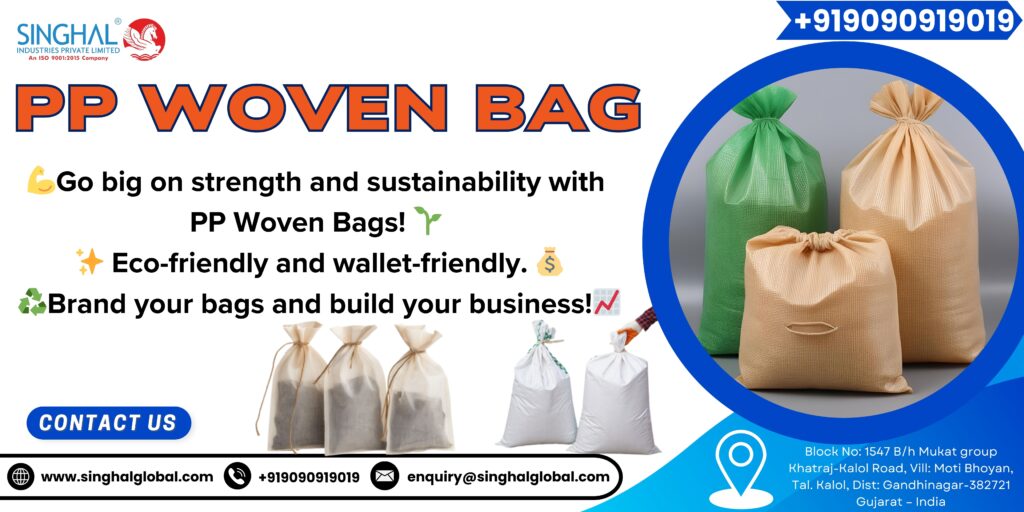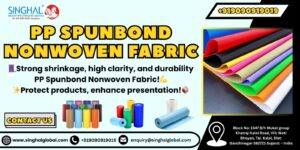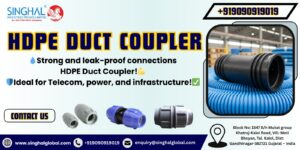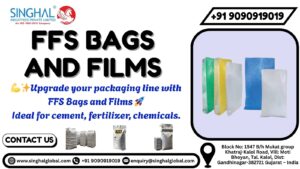These days, more and more attention is being given to sustainability in the world of agriculture. Everyone in the industry is looking for solutions to lessen waste, boost both output and gains, and improve the environment. PP woven bag manufacturers, which people call PP woven bags, have become a major contribution to the green revolution. Because these sacks are strong, simple to handle, and cheap, they are changing the process of keeping, shipping, and protecting farm items.
We should learn how PP woven bag manufacturers encourage sustainable farming and why these bags have become popular for packaging in such communities.
What Are PP Woven Bags?
PP woven bags are created using a thermoplastic polymer material named polypropylene. First, polypropylene is made into flat tapes, then those are woven to make a tough and airy fabric. These fabrics are turned into sacks or bags of all sizes and thicknesses based on their purpose.
Polypropylene woven bags last longer, are more environmentally appropriate, and are stronger than regular plastic bags. Because they are reusable and last for a long time, they are considered a good option for farmers whether they work on small or big farms.
Applications in Sustainable Agriculture
1. Storage and Transportation of Produce
Most people use PP woven bags to store grains, pulses, seeds, potatoes, onions, and similar products from agriculture. Plastic bags are airtight, so trapped moisture is kept away, and they are strong enough to hold a lot without ripping.
2. Fertilizer and Chemical Packaging
Most agricultural chemicals and fertilizers are reactive, which is why proper packaging is made necessary. Extra leakage or pollution can be stopped by laminating or lining your PP woven bag for safe handling and carrying.
3. Soil Stabilization and Erosion Control
As well as packaging, the woven fabric made of polypropylene is involved in soil stabilization. To stop soil erosion and boost land farming, crops, and livestock farming, PP woven geotextiles are used in terraces, ditches, embankments, and along irrigation channels by farmers and those in agriculture.
4. Waste Management and Composting
Farmers who use sustainable methods make sure to handle waste in the right way. Using Polypropylene woven bags is a perfect choice when you want to carry and store compost. Because they don’t easily break down or get affected by outside factors, they are the best farming solution for waste.
5. Animal Feed Packaging
Animal rearing is usually essential in the field of agriculture. Cattle feed, poultry feed, and fish feed are usually put into PP woven sacks for storage and transport. Such films make the feed resistant to moisture, so it stays clean and fresh.
Benefits of Using PP Woven Bags in Farming
Durable and Long-Lasting
Preferred PP woven bags are meant to be used more than once and can last for a long time in normal circumstances. This brings down the expenses and the amount of waste linked with traditional packaging.
Lightweight and Cost-Efficient
Being strong yet very light, PP woven bags cut down on the cost of moving them. Buying pp woven bags in bulk from the manufacturers allows people to save on costs.
Customizable for Agricultural Use
Producers give the option to add UV protection, apply lamination, add graphics or information, and provide plastics in different sizes for farmers. There is a polypropylene bag ready for any type of packing material, big or small.
Eco-Friendly and Recyclable
Since it is possible to recycle polypropylene, the material from used bags can be remade into new things. Because of this, people see them as a green decision, since most plastic isn’t biodegradable.
Growing Demand and Market in India
Since India is a mainly agricultural country, there is a considerable need for agricultural packaging. PP woven bag manufacturers across India are enjoying consistent development as the use of woven bags increases among farmers. You can choose anything from regular sacks to bags that are laminated with BOPP for branding and protection from the weather with these manufacturers.
In India, the PP woven bags price is set by GSM, the bag’s size, whether or not it’s laminated, and the amount you purchase. Usually, bags cost as little as ₹8, but some personalized options can be higher and range from ₹30 to ₹40. Even so, they are cost-effective because they can be brought back many times.
Global Trends and Export Potential
Efforts toward sustainability around the globe have brought higher demand for Polypropylene woven bags in agriculture as well as in construction, shops, and emergency situations. Due to their low prices and great product quality, Indian pp woven bag companies are making a name for themselves in the export market.
Indian PP woven bags are transported to the Middle East, Africa, Europe, Southeast Asia, and several other places, assisting in preserving the environment in agriculture around the globe.
Choosing the Right Manufacturer
Before buying PP woven bags for farming, pick a manufacturer that can be trusted:
- Cancel if your product has quality certifications from organizations such as ISO and BIS.
- Polypropylene that is not recycled and is used in food packaging can be biodegraded.
- Bags made with pp woven material are now affordable.
- Delivering as scheduled and offering customer services after a purchase.
Firms that focus on agricultural packaging are aware of farmers’ and distributors’ needs and make products meant to last and protect the environment.
Conclusion
There is no doubt that PP woven bags support sustainable agriculture. They guarantee efficient storage, careful shipping, and protection of the environment in every aspect of eco-friendly farming. Since the world aims for more eco-friendly choices, woven polypropylene bags are shown to be important in agriculture.
Choosing drugs from reputable manufacturers helps farmers cut costs, make their work more environmentally friendly, and increase how smoothly they operate.
Frequently Asked Questions (FAQs)
Q.1 What industries commonly use PP woven bags?
PP woven bags are employed in both crops, construction materials, the processing of foods, chemical storage, and assistance to those in need. Agriculture mainly uses them as the chosen option for packing grains, seeds, fertilizers, and feed.
Q.2 In what ways are PP woven bags different than plastic bags?
Thin plastic bags are likely to rip, trap moisture, and produce problems for the environment. Since PP woven bags don’t need expensive materials and are very durable, they are eco-friendly and less expensive than other bags.
Q.3 Is it safe to hold chemicals in PP woven bags?
Yes. A lot of PP woven bags have an inner lining that shields against the leakage of chemicals. Before anything else, talk to the maker of your woven bags to ensure the one you get is suitable for storing chemicals.
Q.4 What is the usual weight that a PP woven bag can carry?
The size or type of PP woven bag can let its user load up to 10 kg or even as many as 100 kg. Those models are made for use on industrial and agricultural sites needing lots of nitrogen.









